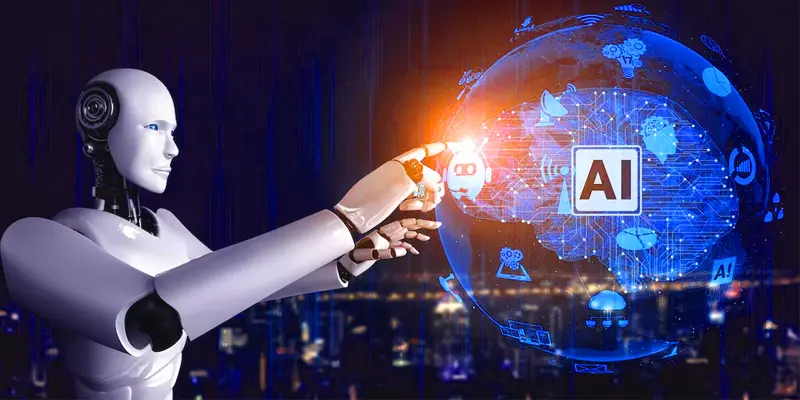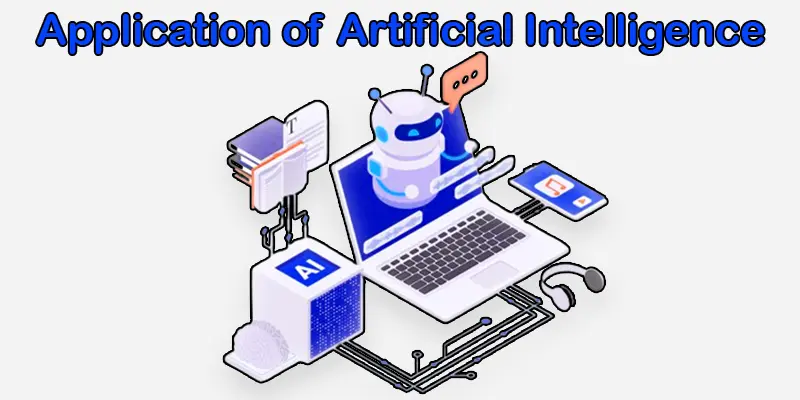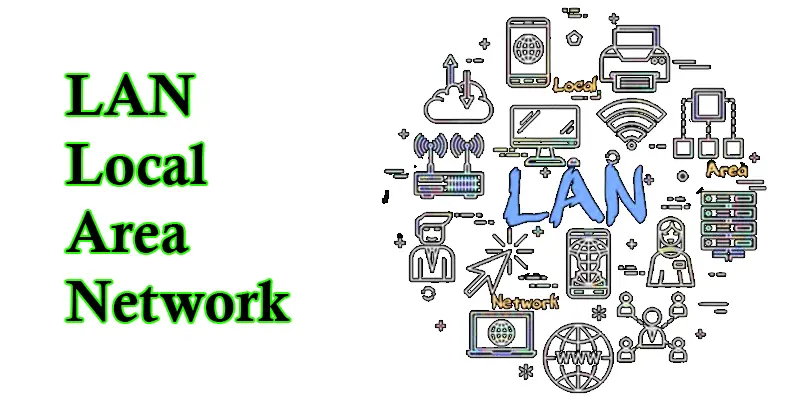Artificial Intelligence (AI)| Applications, Types, Definition, Examples, Pros and Cons
Published: 8 Aug 2024
What is Artificial Intelligence (AI)?
A technology known as artificial intelligence, or AI, enables computers and other devices to think and learn similarly to people. It helps them understand information, solve problems, and make decisions. AI is used in many everyday things, like voice assistants, recommendation systems on streaming services, and even in self-driving cars. By mimicking human intelligence, AI makes our lives easier and opens up new possibilities for the future.
How does AI work?
Artificial intelligence, or AI, performs activities that often require human intelligence using algorithms and vast volumes of data.
- Data Collection: AI systems gather data from text, images, videos, sensor readings, and user interactions.
- Processing: Collected data is cleaned and organized, removing errors and irrelevant information to ensure it’s useful.
- Learning: Machine learning algorithms examine data to identify trends and generate forecasts or choices.
- Model Building: AI builds mathematical models based on the learned patterns to make future predictions or decisions.
- Inference: The AI uses the models to make real-time predictions or decisions, such as understanding spoken commands.
- Feedback and Improvement: Continuous feedback allows AI to fine-tune its models, improving accuracy over time.
AI Importance
AI, or artificial intelligence, is important because it helps make our lives easier and more efficient.
- Personalized Experiences: AI can customize services to fit individual needs. For example, streaming services use AI to recommend movies or shows based on what you like to watch.
- Innovation and Development: AI helps create new technologies and solutions that can solve complex problems. For example, AI is used in self-driving cars, which could make transportation safer and more efficient.
- Enhanced Productivity: Because AI is so good at handling chores, individuals can focus on more important and creative work, increasing productivity across various industries.

What are the Advantages and Disadvantages of Artificial Intelligence (AI)
AI offers significant benefits regarding efficiency, availability, and personalization but poses challenges like job displacement, lack of human touch, and privacy concerns.
Advantages of AI
- Efficiency: AI can complete tasks more quickly and precisely than humans, reducing errors and saving time. For example, AI can quickly analyze large amounts of data that would take humans much longer to process.
- 24/7 Availability: AI systems can work continuously without getting tired or needing breaks. This makes them ideal for tasks that require constant monitoring or operation, such as customer service chatbots that are available around the clock.
- Personalization: AI can tailor experiences to individual preferences. For instance, AI algorithms can recommend products, music, or movies based on past choices, making your experience more enjoyable and relevant.
Disadvantages of Artificial Intelligence
- Job Displacement: As AI takes over repetitive or simple tasks, some jobs may become obsolete, leading to job loss for certain workers. This can create economic and social challenges.
- Lack of Human Touch: AI lacks the empathy, creativity, and understanding humans possess. For example, a chatbot might not be able to comfort someone going through a tough time as well as a human could.
- Privacy Concerns: Privacy and data security must be addressed because AI systems usually require enormous volumes of data to function successfully. Misuse of this data can lead to breaches and the exploitation of personal information.
Strong AI vs Weak AI
| Strong AI |
|---|
Artificial general intelligence (AGI) is made to comprehend, acquire, and apply knowledge to various tasks like humans. Robust AI can reason, think, and solve issues flexibly and adaptively. |
| Weak AI |
|---|
Also known as narrow AI, it is intended to carry out particular duties. Virtual assistants such as Siri or Alexa, which lack general intelligence but can respond to queries and issue commands, should be considered. |
Types of Artificial Intelligence Technology
Researchers are trying to make more intelligent AI and better understand how intelligence and consciousness work. To explain these ideas, they have identified four types of artificial intelligence.
Reactive Machines AI
These AIs can only react to specific situations. They don’t remember past experiences and can’t learn. An example is IBM’s Deep Blue, which plays chess by evaluating current moves.
Limited Memory AI
These AIs can use past experiences to make decisions, but their memory is short-lived. An example is self-driving cars, which use past data like traffic patterns to make decisions.
Theory of Mind AI
This type of AI understands the emotions, beliefs, and intentions of others. It’s still in the research stage and aims to interact more naturally with humans.
Self-aware AI
These artificial intelligences are conscious and self-aware, aware of their feelings and ideas. This is a theoretical idea that has not yet come to pass.
What is Artificial Intelligence Examples, and How are They Used Today?
AI is woven into many parts of our daily lives, making things more convenient, efficient, and personalized.
- Virtual Assistants
- Examples: Siri, Alexa, Google Assistant
- Usage: Addressing inquiries, establishing reminders, and managing smart home appliances.
- Recommendation Systems
- Examples: Netflix, Amazon, Spotify
- Usage: Suggesting movies, products, or music based on user preferences and past behavior.
- Self-Driving Cars
- Examples: Tesla Autopilot, Waymo
- Usage: Navigating roads, avoiding obstacles, and assisting with driving tasks.
- Chatbots
- Examples: Customer service bots, ChatGPT
- Usage: Handling customer inquiries, providing information, and assisting with tasks through text or voice.
- Image and Speech Recognition
- Examples: Face ID on iPhones, Google Translate
- Usage: Unlocking devices with facial recognition and translating spoken language in real-time.
Applications of AI
Explore numerous application of artificial intelligence, each performing different tasks.
- Healthcare: AI analyzes medical images, diagnoses diseases, and recommends treatments, improving patient care and operational efficiency in hospitals.
- Finance: In the financial sector, AI helps with fraud detection, automates trading, and provides personalized financial advice, enhancing security and investment strategies.
- Customer Service: The chatbots and virtual assistants of AI-powered enhance user satisfaction and response times by addressing consumer inquiries, resolving issues, and providing 24/7 support.

Augmented Intelligence vs Artificial Intelligence
| Augmented Intelligence |
|---|
|
| Artificial Intelligence (AI) |
|---|
|
Ethical Use of AI
Ethical use of artificial intelligence means using AI in fair, responsible, and beneficial ways for everyone.
- Fairness: AI should be designed to avoid bias and treat everyone equally. For example, AI should not discriminate based on gender or race when hiring.
- Transparency: It should be clear how AI makes decisions. People should understand how an AI system works and why it makes certain choices.
- Privacy: AI should respect people’s privacy by protecting personal data and using it responsibly. For instance, AI should not misuse or expose sensitive information.
History of AI: what is?
AI started as a dream in the 1950s, faced ups and downs, and has become a powerful tool we use daily.
1950s
Beginning: The idea of AI began with computers getting smarter. Alan Turing proposed the concept of machines that could think.
1960s-1970s
Early Development: Scientists developed the first artificial intelligence (AI) programs that could play chess and solve issues.
1980s
AI Winter: Progress slowed because AI didn’t meet high expectations. Funding and interest in AI research dropped.
1990s
Renewed Interest: AI started improving with better algorithms and more powerful computers.
2000s
Rise of Machine Learning: AI shifted towards machine learning, where computers learn from data. This led to advancements in speech recognition, image processing, and more.
2010s
Deep Learning Boom: AI made huge leaps with deep learning, a type of machine learning. AI systems could recognize speech, translate languages, and even drive cars.
Today
Everyday Use: AI is currently used in many aspects of our daily lives, from Netflix and Amazon recommendation engines to virtual assistants like Siri and Alexa. It continues to evolve, promising even more advanced and intelligent applications.
What is AI in the workforce?
AI in the workforce refers to integrating artificial intelligence technologies to enhance work processes and productivity. AI may automate routine jobs like scheduling and data input, allowing staff members to work on more intricate and imaginative projects. It helps in decision-making by quickly analyzing large amounts of data, helping professionals like doctors and business analysts make informed choices.
AI also improves efficiency by optimizing processes and reducing errors. It personalizes customer and employee experiences, such as tailored marketing and customized training programs. But now, AI helps people work smarter and more effectively.
Build AI Skills on Coursera
Building AI Skills on Coursera means taking online courses to learn how to create and work with artificial intelligence. These courses teach you how to design, develop, and apply AI technologies, including machine learning and data analysis. Coursera offers various classes and specializations from top universities and companies to help you gain the skills needed for a career in AI.
Conclusion
The technological field of artificial intelligence (AI) aims to create machines and systems with cognitive capacities similar to those of humans, including reasoning, learning, and decision-making. It entails creating intelligent computers capable of problem-solving, picture analysis, and speech recognition. Artificial intelligence (AI) is employed in many aspects of our lives, including medical diagnosis, tailored suggestions, and self-driving automobiles. As AI technology continues to develop, it promises to make our lives more convenient and help us tackle complex challenges.
FAQS (Frequently Asked Questions)
How is artificial intelligence (AI) used in healthcare?
AI helps doctors by analyzing medical images, diagnosing diseases, suggesting treatments, and managing patient data. It can also predict patient outcomes and personalize care.
How is artificial intelligence (AI) used in film?
AI creates special effects, improves animation, helps with scriptwriting, and edits films. It can also analyze audience reactions to make better movies.
How does artificial intelligence (AI) relate to machine learning?
AI: The overall field of creating smart systems.
Machine learning: AI refers to teaching computers to learn from data and improve their performance on tasks without requiring them to be specially programmed.
What is the role of artificial intelligence (AI) in computers?
AI in computers involves using advanced algorithms to perform tasks requiring human-like thinking, such as speech recognition, image understanding, and decision-making.
What is the relationship between artificial intelligence (AI) and expert systems?
AI: A broad field of creating intelligent systems.
Expert systems: An AI subtype that imitates human experts’ decision-making processes. They apply unique guidelines and expertise to address issues in a given field.

- Be Respectful
- Stay Relevant
- Stay Positive
- True Feedback
- Encourage Discussion
- Avoid Spamming
- No Fake News
- Don't Copy-Paste
- No Personal Attacks

- Be Respectful
- Stay Relevant
- Stay Positive
- True Feedback
- Encourage Discussion
- Avoid Spamming
- No Fake News
- Don't Copy-Paste
- No Personal Attacks





